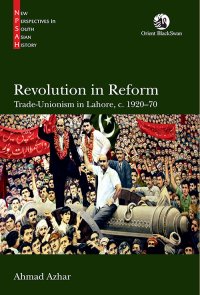
Ebook: Revolution in Reform: Trade-Unionism in Lahore, c. 1920-70
Author: Ahmad Azhar
- Series: New Perspectives in South Asian History
- Year: 2019
- Publisher: Orient BlackSwan
- Language: English
- pdf
Late-colonial Lahore witnessed the rise of organised workers’ politics with the unionisation of native Indian workers at the Mughalpura railway workshops in 1920. Various ideological tendencies—the Owenist, Labourite and Communist traditions—began to come together while power struggles gradually led to rifts within the trade-union. Revolution in Reform: Trade-Unionism in Lahore, c. 1920–70 explores these previously unrecognised ambivalences.
Ahmad Azhar questions previous research that have traditionally considered labour politics of inter-war Punjab as mere preludes to Partition. He studies crucial moments: the railway strike of 1920; Mughalpura’s quest for autonomy in the inter-war years; the relation of labour politics with ‘Swaraj’ and the Indian National Congress (1919–47); and the Meerut Conspiracy Case and the Royal Commission on Labour in India.
The author also reconstructs events of the time from the narrative of Mirza Ibrahim, a key worker–militant leader, to analyse the repression faced by workers in the Mughalpura movement under communist hegemony. Through hitherto unused ego documents (mostly in the vernacular) of leaders such as J. B. Miller, M. A. Khan, Bashir Ahmed Bakhtiar and Saif-ur-Rehman, the author brings alive the conflicting aspects of trade-union leadership in a politically charged period in the history of inter-war Punjab, and post-Partition Pakistan.
Ahmad Azhar questions previous research that have traditionally considered labour politics of inter-war Punjab as mere preludes to Partition. He studies crucial moments: the railway strike of 1920; Mughalpura’s quest for autonomy in the inter-war years; the relation of labour politics with ‘Swaraj’ and the Indian National Congress (1919–47); and the Meerut Conspiracy Case and the Royal Commission on Labour in India.
The author also reconstructs events of the time from the narrative of Mirza Ibrahim, a key worker–militant leader, to analyse the repression faced by workers in the Mughalpura movement under communist hegemony. Through hitherto unused ego documents (mostly in the vernacular) of leaders such as J. B. Miller, M. A. Khan, Bashir Ahmed Bakhtiar and Saif-ur-Rehman, the author brings alive the conflicting aspects of trade-union leadership in a politically charged period in the history of inter-war Punjab, and post-Partition Pakistan.
Download the book Revolution in Reform: Trade-Unionism in Lahore, c. 1920-70 for free or read online
Continue reading on any device:

Last viewed books
Related books
{related-news}
Comments (0)